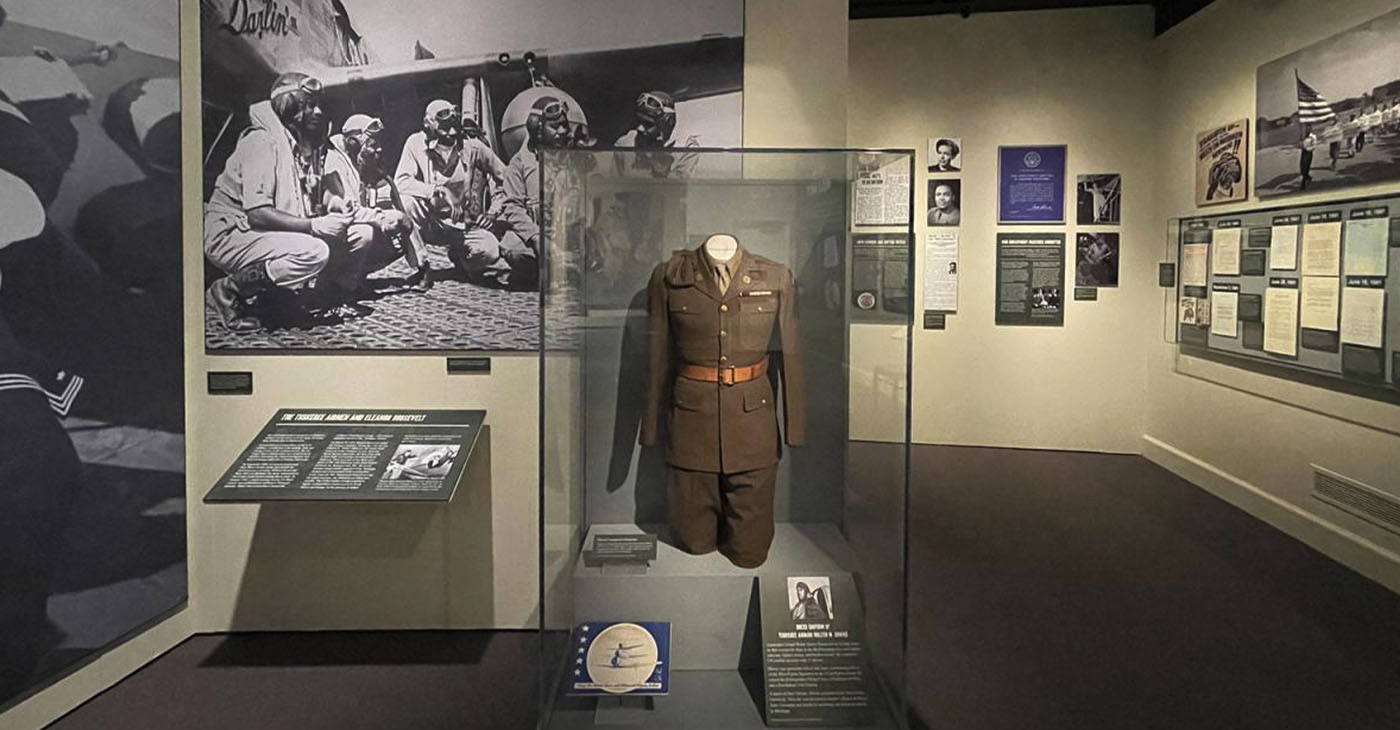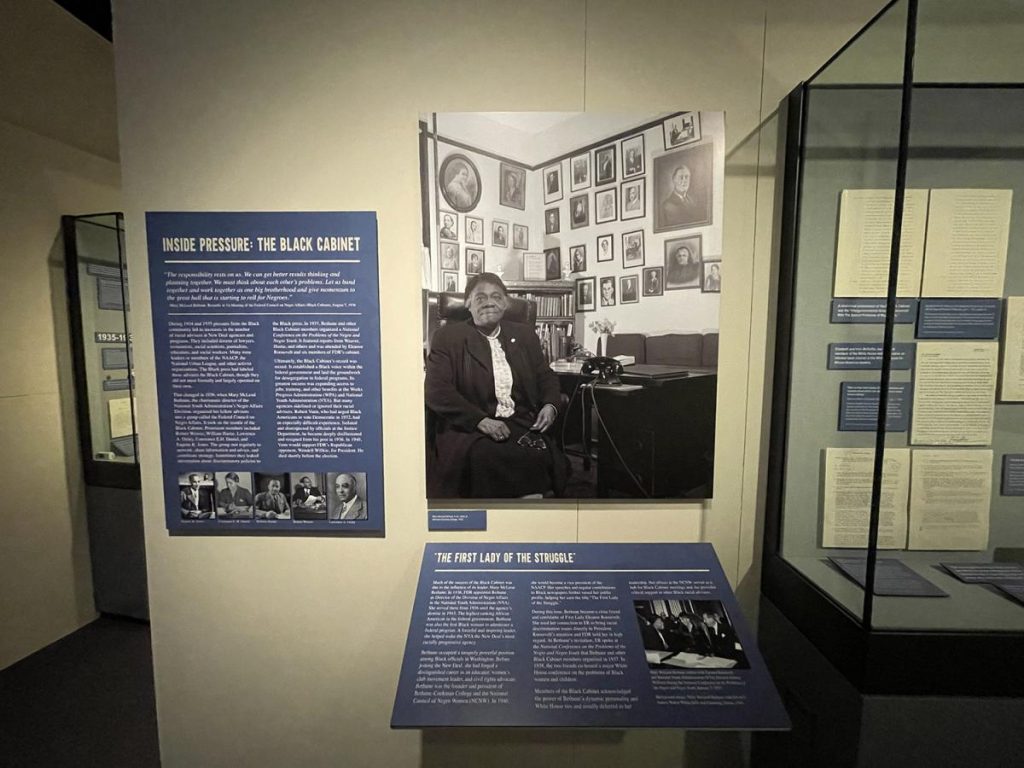Black History
Civil Rights Exhibit Opens at Franklin D. Roosevelt Library and Museum in New York
Hyde Park, NY — The opening of the Franklin D. Roosevelt Library and Museum’s feature exhibit, “Black Americans, Civil Rights, and the Roosevelts, 1932–1962,” allows the library to share its extensive collection relating to Black American history. By highlighting these critical primary sources, the library’s team aims to inspire a deeper understanding of Black American experiences and a critical evaluation of the period.

By Kristin Phillips
National Archives News
Hyde Park, NY — The opening of the Franklin D. Roosevelt Library and Museum’s feature exhibit, “Black Americans, Civil Rights, and the Roosevelts, 1932–1962,” allows the library to share its extensive collection relating to Black American history. By highlighting these critical primary sources, the library’s team aims to inspire a deeper understanding of Black American experiences and a critical evaluation of the period.
The exhibition showcases archival documents from across the library’s collections. It centers the historical voices of many Black community leaders, wartime service members, and other citizens who directly engaged the Roosevelt administration and pushed for progress.
“This exhibit looks critically at how Black Americans fared under the New Deal and throughout the Roosevelt administration, and how the Roosevelts worked with prominent Black American leaders and advanced the causes of civil rights,” said Supervisory Curator Herman Eberhardt.
The story emerges as one of Black Americans organizing and expanding national networks of political allies to create new opportunities for social justice and to find ways to combat Jim Crow segregation, widespread discrimination, and the harsh and often violent realities of racism in America.
From the Great Depression and New Deal through World War II and the postwar Civil Rights movement, “Black Americans, Civil Rights, and the Roosevelts” offers critical perspectives on, and candid assessments of, the administration’s policies and practices and of the Roosevelts themselves.

Records relating to educator, activist, writer, Presidential adviser, and the first Black woman to head a federal agency, Mary McLeod Bethune, on display in the new exhibit. Photo courtesy Clifford Laube.
“The FDR Library may not come to mind as a destination for studying Black history, but in fact there is tremendous documentation of Black perspectives, and evidence of government interactions with Black communities, preserved and made available here,” said Supervisory Archivist Kirsten Carter.
“There are countless and very moving testimonies of Black American experiences woven deeply throughout the archives. With this exhibition, the library has an opportunity to share and celebrate these primary sources, and hopefully to inspire new, original research.
The exhibit was developed over three years, in collaboration with a committee of distinguished scholars chaired by David Levering Lewis, a Pulitzer Prize–winning American historian and professor at New York University. It draws from archival collections at the Roosevelt Library and beyond.
The Tuskegee Airmen National Historical Museum loaned a complete uniform. Many political campaign and protest materials like buttons, fliers, signs, and newspapers came from private collections nationwide.
Many documents and artifacts in the exhibit are on display for the first time. One example is a letter from Mary McLeod Bethune, educator, activist, writer, Presidential adviser, and the first Black woman to head a federal agency. Her letter to FDR in June 1938 encouraged him to support a bill to increase federal funding for Black American education in the South. These materials provide evidence of the unrelenting efforts of many key figures of the early civil rights movement, such as Bethune.
Exhibits also document the racism and discrimination in American politics as well as the culture of the era, highlighting the contradictions inherent in fighting for democracy abroad while injustice persisted at home.
“Our hope is that this exhibition will spark civil dialogue and engagement, leading to an inspired change in our nation,” said Roosevelt Library Director William Harris. “We’ve seen examples of this throughout history with our nation’s courage to overcome the Great Depression and how the world joined together to overcome fascism during World War II.”
Black Americans, Civil Rights, and the Roosevelts, 1932–1962, is on display through December 31, 2024. For more information, visit the library and museum’s website. The Franklin D. Roosevelt Library and Museum is on the eastern shore of the Hudson River, four miles north of Poughkeepsie, New York, midway between New York City and Albany. The library is easily reached by car, train, or plane.
Activism
Oakland Post: Week of July 2- 8, 2025
The printed Weekly Edition of the Oakland Post: Week of July 2 – 8, 2025

To enlarge your view of this issue, use the slider, magnifying glass icon or full page icon in the lower right corner of the browser window.
Activism
Oakland Post: Week of June 25 – July 1, 2025
The printed Weekly Edition of the Oakland Post: Week of June 25 – July 1, 2025

To enlarge your view of this issue, use the slider, magnifying glass icon or full page icon in the lower right corner of the browser window.
Activism
Oakland Post: Week of June 18 – 24, 2025
The printed Weekly Edition of the Oakland Post: Week of June 18 – 24, 2025

To enlarge your view of this issue, use the slider, magnifying glass icon or full page icon in the lower right corner of the browser window.
-

 Activism4 weeks ago
Activism4 weeks agoOak Temple Hill Hosts Interfaith Leaders from Across the Bay Area
-

 Alameda County4 weeks ago
Alameda County4 weeks agoCouncil Approves Budget to Invest in Core City Services, Save Fire Stations, Invest in Economic Development
-

 Activism4 weeks ago
Activism4 weeks agoOakland Post: Week of June 11 – 17, 2025
-

 Activism4 weeks ago
Activism4 weeks agoLA to the Bay: Thousands Protest in Mission District Against Immigration Raids, Travel Bans
-

 Activism4 weeks ago
Activism4 weeks agoOver 500 Join Interfaith Rally in Solidarity with Los Angeles Resistance to Trump Invasion
-

 Activism3 weeks ago
Activism3 weeks agoCongress Says Yes to Rep. Simon’s Disability Hiring and Small Biz Support Bill
-

 Activism3 weeks ago
Activism3 weeks agoOPINION: California’s Legislature Has the Wrong Prescription for the Affordability Crisis — Gov. Newsom’s Plan Hits the Mark
-

 Activism3 weeks ago
Activism3 weeks agoThe Case Against Probate: False Ruling Invalidates Black Professor’s Estate Plan, Ignoring 28-Year Relationship





















































